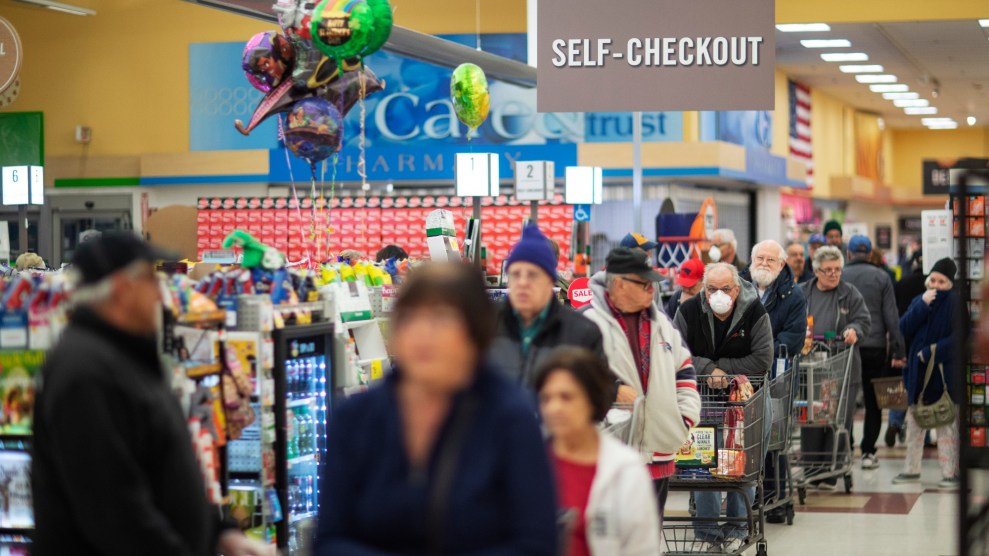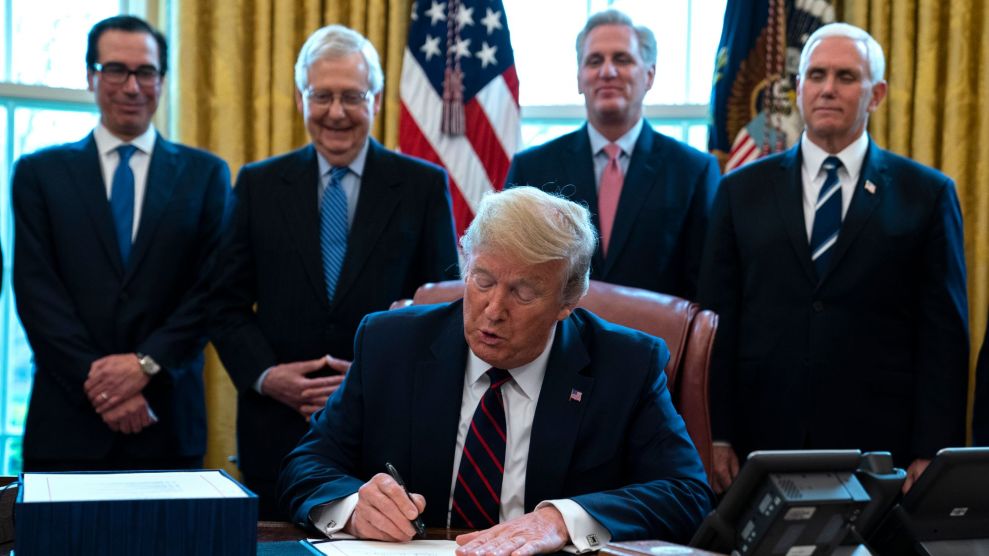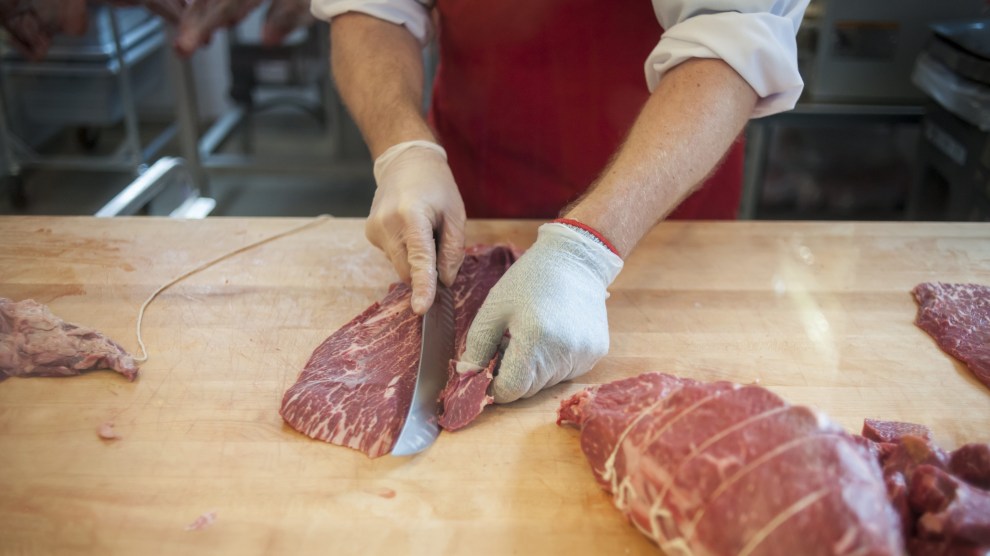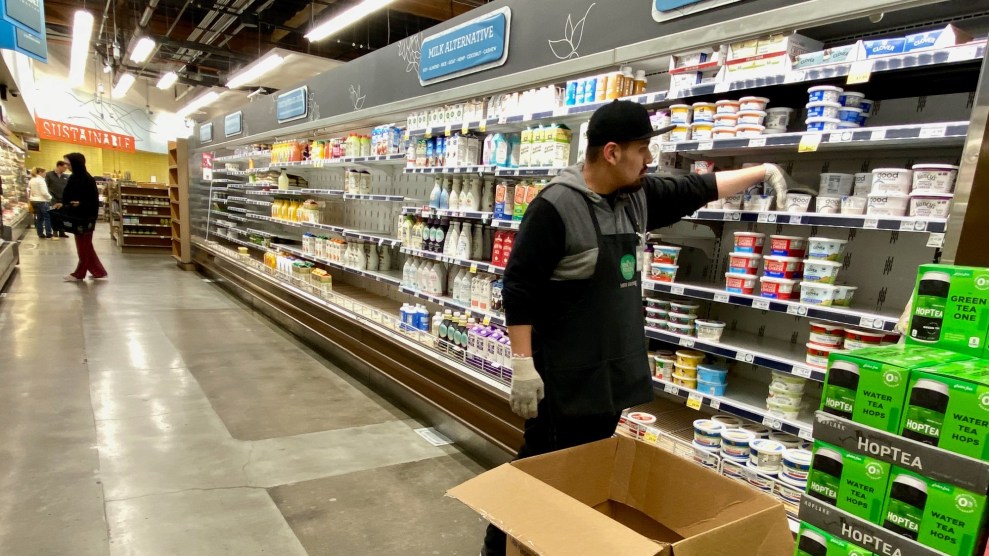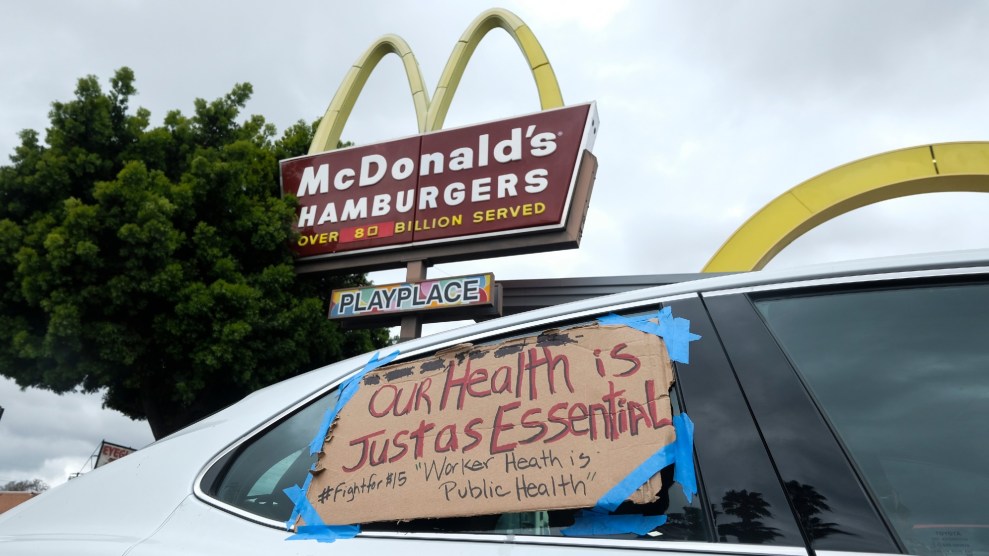
McDonald's workers in Los Angeles held a drive-through strike Sunday after one of their co-workers tested positive for COVID-19. Three days later, another employee of the same McDonald's received a coronavirus diagnosis.Ringo Chiu/ZUMA
Workers at two California McDonald’s locations filed complaints with the California Division of Occupational Safety and Health this week alleging that their employers have created hazardous conditions that put them at risk of the coronavirus. The complaints come as more than 700 fast food workers, primarily at McDonald’s restaurants, have gone on strike across the country over the past month.
Though many restaurants have shuttered, most fast food establishments remain open for drive-through and takeout. But striking fast food workers say their employers are not doing enough to protect them from getting sick or compensating them for the added risk of working during the coronavirus. In some stores, workers say McDonald’s is not even providing sufficient soap or hand sanitizer, much less masks. They are concerned about their access to paid time off to self-quarantine. Some are paid barely above minimum wage.
The complaints, filed by workers in San Jose and Los Angeles restaurants, echo those concerns.
“The conditions in our store pose an imminent danger to our health and that of our co-workers, because [of the] frequent lack of gloves, soap, and hand sanitizer; the fact that we are in very frequent contact with the general public; and the company’s failure to create an effective social distancing system for workers and customers,” the San Jose complaint states.
“There’s always something missing,” says Ana Martinez, who went on strike from the San Jose McDonald’s this week.
At a Los Angeles McDonald’s, workers filed a Cal/OSHA complaint alleging lack of hand sanitizer and a proper social distancing system. The complaint also alleges their managers mishandled a coronavirus case in the store.
“Last week, a worker was identified as having COVID-19, but the managers did not inform all the workers who were in the store during that week and might have had either direct or indirect contact with the sick worker,” the complaint states. “The manager told one worker to self-quarantine, but did not inform the other workers.”
Days after the Los Angeles Cal/OSHA complaint was filed, a second worker at the same location tested positive for COVID-19. Verli Godinez, a 56-year-old grandmother who has been on strike since Sunday, received her diagnosis on Wednesday.
“I’m terrified for myself and family, but I’m also angry because I would still be healthy if McDonald’s thought as much about our safety as its profits,” Godinez said in a statement.
“As soon as we were notified of each of these confirmed cases, we immediately closed the restaurant to thoroughly deep clean the restaurant and notify local health authorities,” Nicole Enearu, the owner and operator of the Los Angeles McDonald’s where two employees tested positive, said in a statement. “At the same time, we identified and reached out to all restaurant staff who had been in close contact with the employee who contracted the virus. These employees have been asked to self-quarantine for 14 days to ensure they remain healthy before returning to work and are being paid while they are away from the restaurant.” Enearu said the store would reopen after a professional sanitization. “We are committed to paying our employees while we work to reopen.”
Workers at the Los Angeles store where Godinez works are demanding to be paid fully for a two-week quarantine period.
“In situations where an employee reports an infection and is diagnosed with COVID-19, those who have been in close contact with that worker should be notified immediately and asked to self-quarantine for a period of 14 days since they were last exposed to the affected employee,” says Leslie Phillips, an epidemiologist at the SEIU 775 Benefits Group who spoke on a Zoom strike line with fast food workers Thursday. “Any delay in that type of notification could lead to transmission to others that could have been prevented by timely communication and the self-quarantine process.”
Yet on Wednesday, the CDC relaxed guidelines for essential workers who have been exposed to the coronavirus. CDC director Robert Redfield announced Wednesday that essential workers who have been exposed to the coronavirus should continue to report to work as long as they are not showing symptoms. Redfield’s announcement came eight days after he told NPR that as many as 25 percent of coronavirus cases could be asymptomatic.
The complaints come as frustration mounts that the federal Department of Labor is not taking action to protect essential workers.
“Frustrations have built among career staff at the Labor Department that the agency hasn’t ordered employers to follow safeguards, including the wearing of masks, recommended by the Centers for Disease Control and Prevention to protect workers,” the Washington Post reported Friday.
According to a survey of more than 800 McDonald’s workers released by the Service Employees International Union this week, 92 percent of workers reported limited or no availability of masks. More than 40 percent of employees also reported limited availability of gloves and hand sanitizer. Fifteen percent of surveyed workers said they have limited or no hand soap.
In a statement, McDonald’s said it was “working tirelessly” to obtain supplies like non-medical grade masks. “Masks are starting to arrive in franchisee and company owned restaurants with allocation going first to areas where the use of masks is required by law, to hotspots with a high level of confirmed cases in the community and then to the rest of the country,” a spokesperson said. “While we fulfill supply across the country, we are recommending the use of DIY mask solutions consistent with recent CDC guidance.” McDonald’s has also said it is making gloves available to employees.
California Assemblyman Ash Kalra, speaking at the Zoom call, noted that as essential employees, fast food workers are helping people feed their families safely and creating revenue for their bosses.
“The only ones that are left without benefiting from being called essential workers are the actual essential workers,” Kalra said. “This is nothing short of class warfare.”

